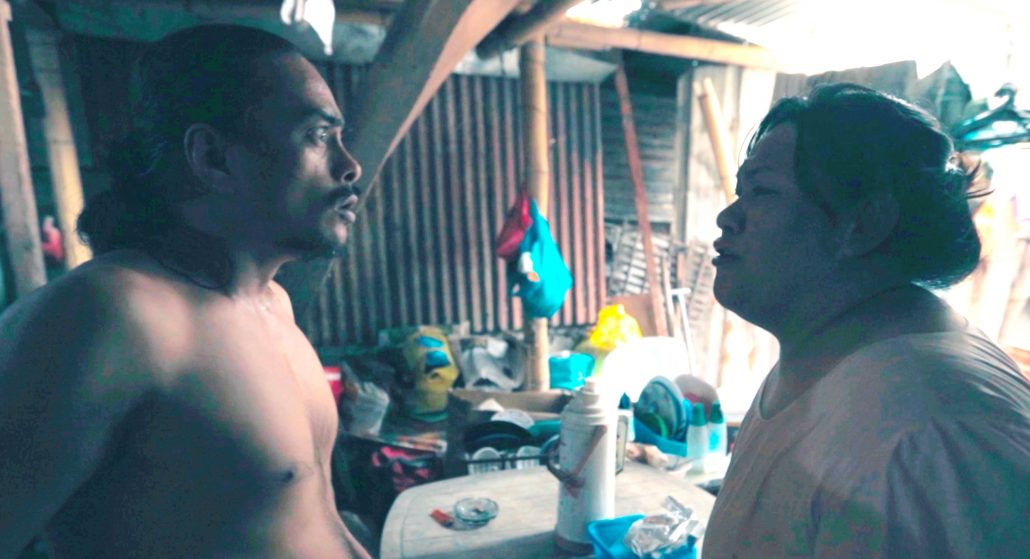
BY REI HONTANAR, UP VISAYAS
KEVIN Pison Piamonte is unstoppable. His recent showstopper is an electrifying cinematic adaptation of Leoncio P. Deriada’s Palanca-winning masterpiece, “The Dog Eaters”. Piamonte’s homage to Deriada’s literary genius is a feminist manifesto amidst a feral, patriarchal bacchanalia.
The film opens with a series of images that build the world of Artiaga street: wooden shanties braving the test of time, women fighting with their husbands, dogs and children going astray, and drunk men salivating over dog stew. We first see Mariana, played by actress Sunshine Teodoro as she silently gazes at the world outside her window: sky-high buildings that display progress and mock the desolation of the place she calls home. With cinematic visualizations of paranoia, poverty, and marital abuse that continue to bombard her psyche, the struggles of Mariana hearken to the archetype of the “mad woman in the attic”, but instead of chaining her in silence, Piamonte reconstructs the image by giving the woman a strong sense of defiance.

The tension starts to build up as her husband comes home drunk early in the morning. The film weaves a clear image of toxic masculinity in Victor. We see actor Nathan J. Sotto bring to life one of the most unforgettable antagonists in Western Visayan Literature, a tyrannical husband who drinks away his frustrations and resorts to physical and psychological abuse to reinforce his domination. The film captures a patriarchal world where hyper-macho ideals normalize aggression, entitlement, and ownership of women’s bodies. The notorious dog eaters of Artiaga street succumb into a pseudo-orgiastic revelry that transforms them into feral beasts with their raunchy language, their thirst for alcohol and animal meat, and their rabid sexualization of women. Through graphic visuals and boorish behaviour of its male characters, Piamonte presents the internal dehumanization and external grotesqueness caused by urban decay.
Beyond its exploration of poverty and the commodification of women’s bodies, one of the most relevant issues presented by the film is the tradition of misogynistic silence that prevails in patriarchal spaces. Whenever a fight breaks between Victor and Mariana, he would angrily threaten to shut her mouth. “Kalma ka da”, “Hipos ka da”, “Hiposa da sungad mo kumuson ko na karon” become Victor’s battle cry against the rage of his wife. This imposition of power and powerlessness reveals a culture of trauma that women have to endure. In most male-dominated cultures, violence is normalized to maintain the status quo and chain women into absolute submission.
Dog Eaters reaches its cinematic crescendo with the showdown of forces between husband and wife, madness and monstrosity amalgamate into a wave of frenzy when Victor discovers Mariana’s plan to abort her baby. Deriada’s masterpiece was ahead of its time when it presented a radical take on women’s agency back in the 1980s. Piamonte brings the conversation into the contemporary age by highlighting Mariana’s decision to take control of her body. While it remains a controversial topic to most people, Mariana’s defiance is not just an act of liberation against the perils of poverty and her oppressive husband, but it also functions as a display of subversion against a system that only views her as her husband’s libidinal and reproductive vessel. “Lawas ko ni!” may sound like a cry of madness to Victor, but for Mariana, it solidifies her cathartic emancipation from years of marital abuse and misogynistic silence.
With Dog Eaters, Kevin Pison-Piamonte continues to create controversial, yet important conversations that question archaic and malecentric narratives. In the face of poverty and patriarchy, madness becomes the most logical option. Following the tradition of suffering women who rise from the shadows of oppression, Mariana’s bloody, yet beautiful emancipation reminds us of the plight of Bona, Insiang and many other heroines in Philippine Cinema who turned their suffering into rage, and their pain into power./PN



